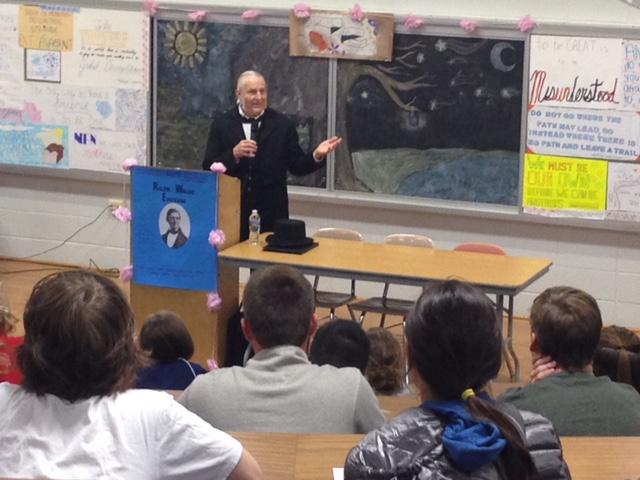“Celebrate the Arts” speaker series welcomes Emerson
TOWAMENCIN- Wendell Refior, who has been studying Ralph Waldo Emerson since 1996, presented Emerson’s essay “Self-Reliance” to NPHS students on October 24th. A man who completely immersed himself in Emerson’s life by dressing in authentic garb, having real sideburns, and even checked the time with his pocket watch, Refior was the first to speak in “Celebrate the Arts,” a speaker series funded by The NPSD Educational Foundation. The presentation included the reading of select passages from “Self Reliance,” as well as questions and discussions from the audience.
During the presentation, students explored subjects such as individualism, nature, conformity, consistency in traditions, and blind obedience. Above all, students were taught to think for themselves, as Refior described.
“The concept of ‘Self-Reliance’ depends on a man realizing that he has as big a universe inside himself as the universe outside,” said Refior.
The importance of the presentation goes beyond the concepts that the students learned, as Janet Kratz, a NPHS English teacher who organized the speaker series, explained.
“In today’s world students hear repeatedly how important careers in STEM fields are,” said Kratz. “I had an idea for a speaker series to celebrate the arts, to celebrate writing and thinking. My two pronged approach was to celebrate the arts and also open a door to appreciating the arts now and later.”
While she did recognize the importance of the STEM fields, Kratz also emphasized the importance of arts and humanities.
“The arts celebrate our common humanity in a different way than science ever can,” said Kratz.
The presentation reached out to students who are passionate about the arts, as Ellie Griffiths, a senior who enjoyed the event, described.
“I really appreciate the opportunity to hear about something that I care about,” said Griffiths. “I enjoyed learning more about Emerson and hearing the opinions of the other students. I learned a lot about his views on self-reliance and non-conformity.”
Through the presentation, students were given opportunities not usually found in the classroom, as Kratz explained.
“It was nice that [students] got to hear from each other and hear from someone who feels passionately about a philosopher,” said Kratz. “They got to spend 45 minutes talking about heady philosophical topics like conformity and conscience and individual spark, and I don’t know that that’s a conversation that happens every day in any classroom, even English classrooms.”
In addition, students learned about Emerson’s philosophy, which is relevant in the modern day
“Philosophers are idealists. It doesn’t mean that that philosophy pertains to every minute of every day of every situation, of course not; reality is reality. But there is a time when we all need a little philosophy. The challenges we have now have existed before and will probably exist long after we’re gone,” said Kratz. “Philosophy is timeless. Just because the words were said a long time ago doesn’t mean that they don’t still apply today”
Griffiths felt the same way towards Emerson’s philosophy.
“Although he lived in the 19th century, we can still learn from Emerson. His writing still holds true in the 21st century and can be applied to our lives today,” Griffiths said.


